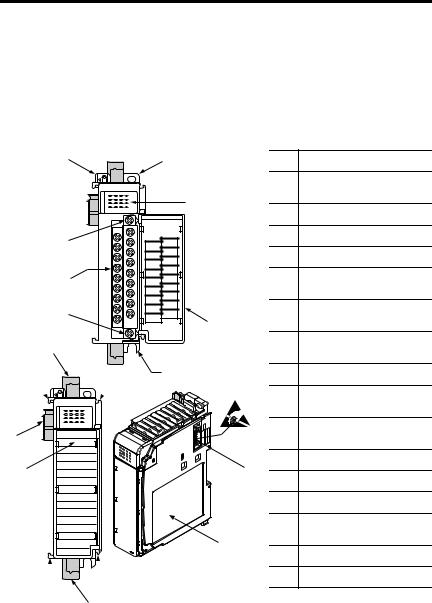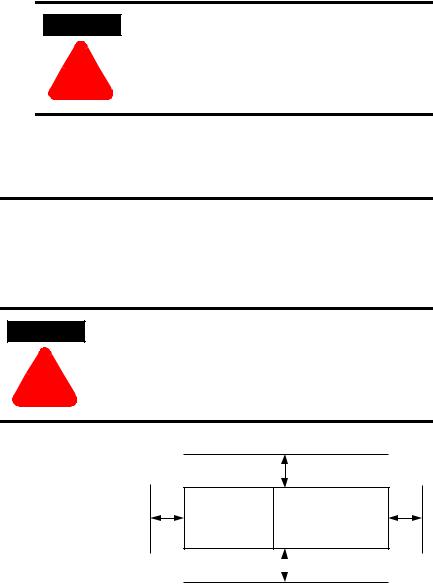Rockwell Automation 1769-OW8I User Manual

Installation Instructions
Compact™ Individually Isolated
AC/DC Relay Output Module
(Catalog Number 1769-OW8I, Series B)
Inside |
|
Module Description ................................................................................. |
2 |
Module Installation.................................................................................. |
3 |
System Assembly..................................................................................... |
4 |
Mounting Expansion I/O .......................................................................... |
5 |
Replacing a Single Module within a System .......................................... |
7 |
Field Wiring Connections......................................................................... |
8 |
I/O Memory Mapping ............................................................................ |
11 |
1769-OW8I Configuration File ............................................................... |
12 |
Spare/Replacement Module Parts ........................................................ |
13 |
Specifications ........................................................................................ |
14 |
Hazardous Location Considerations ...................................................... |
17 |
Environnements dangereux ................................................................... |
17 |
For More Information ............................................................................. |
18 |
Publication 1769-IN053A-EN-P - April 2001

2 Compact™ Individually Isolated AC/DC Relay Output Module
Module Description
1
10a
10
10b
8a
7a
5a
9
7b
 7a
7a
 7b
7b
8b
|
2a |
Item |
Description |
|
|
|
1 |
bus lever |
|
|
|
3 |
(with locking function) |
|
|
|
|
||
|
|
2a |
upper panel mounting tab |
|
DANGER |
2b |
lower panel mounting tab |
||
Do Not Remove RTB Under Power |
||||
Unless Area is Non-Hazardous |
||||
|
VAC-VDC |
|
|
|
OUT 0 |
0 |
|
|
|
|
VAC-VDC |
3 |
I/O diagnostic LEDs |
|
|
VAC-VDC |
|||
OUT 1 |
1 |
|
|
|
|
|
|
||
OUT 2 |
2 |
|
|
|
|
VAC-VDC |
4 |
|
|
OUT 3 |
3 |
module door with terminal |
||
OUT 4 |
4 |
|||
|
VAC-VDC |
|
identification label |
|
OUT 5 |
5 |
|
||
|
VAC-VDC |
|
|
|
|
VAC-VDC |
|
|
|
OUT 6 |
6 |
|
|
|
VAC-VDC |
5a |
movable bus connector |
||
|
||||
|
NC |
|||
OUT 7 |
7 |
|
|
|
|
|
with female pins |
||
Bus Lever is Unlatched/Latched |
|
|||
NC |
|
4 |
|
|
|
Ensure Adjacent |
|
||
Before/After |
|
|||
Removing/Inserting Module |
|
|
||
|
1769-OW8I |
5b |
stationary bus connector |
|
|
|
|||
|
|
|
with male pins |
|
|
2b |
6 |
nameplate label |
|
|
|
7a |
upper |
|
|
|
|
tongue-and-groove slots |
|
|
|
7b |
lower |
|
|
|
|
tongue-and-groove slots |
|
|
|
8a |
upper DIN rail latch |
|
|
|
5b |
lower DIN rail latch |
|
|
|
8b |
||
|
|
9 |
write-on label (user ID tag) |
|
|
|
10 |
removable terminal block (RTB) |
|
|
|
6 |
with finger-safe cover |
|
|
|
RTB upper retaining screw |
||
|
|
10a |
||
|
|
10b |
RTB lower retaining screw |
|
Publication 1769-IN053A-EN-P - April 2001

Compact™ Individually Isolated AC/DC Relay Output Module |
3 |
|
|
Module Installation
Compact I/O is suitable for use in an industrial environment when installed in accordance with these instructions. Specifically, this equipment is intended for use in clean, dry environments (Pollution degree 2(1)) and to circuits not exceeding Over Voltage Category II(2) (IEC 60664-1).(3)
Prevent Electrostatic Discharge
Electrostatic discharge can damage integrated circuits or ATTENTION semiconductors if you touch bus connector pins. Follow these
guidelines when you handle the module:
!• Touch a grounded object to discharge static potential.
•Wear an approved wrist-strap grounding device.
•Do not touch the bus connector or connector pins.
•Do not touch circuit components inside the module.
•If available, use a static-safe work station.
•When not in use, keep the module in its static-shield box.
Remove Power
Remove power before removing or inserting this module. When ATTENTION you remove or insert a module with power applied, an
electrical arc may occur. An electrical arc can cause personal
!injury or property damage by:
•sending an erroneous signal to your system’s field devices, causing unintended machine motion
•causing an explosion in a hazardous environment
Electrical arcing causes excessive wear to contacts on both the module and its mating connector. Worn contacts may create electrical resistance.
(1)Pollution Degree 2 is an environment where, normally, only non-conductive pollution occurs except that occasionally a temporary conductivity caused by condensation shall be expected.
(2)Over Voltage Category II is the load level section of the electrical distribution system. At this level transient voltages are controlled and do not exceed the impulse voltage capability of the product’s insulation.
(3)Pollution Degree 2 and Over Voltage Category II are International Electrotechnical Commission (IEC) designations.
Publication 1769-IN053A-EN-P - April 2001

4 Compact™ Individually Isolated AC/DC Relay Output Module
System Assembly
The module can be attached to the controller or an adjacent I/O module before or after mounting. For mounting instructions, see "Panel Mounting" on page 6, or "DIN Rail Mounting" on page 7. To work with a system that is already mounted, see "Replacing a Single Module within a System" on page 7.
The following procedure shows you how to assemble the Compact I/O system.
|
3 |
|
4 |
2 |
1 |
|
 6
6
1
5
1.Disconnect power.
2.Check that the bus lever of the module to be installed is in the unlocked (fully right) position.
3.Use the upper and lower tongue-and-groove slots (1) to secure the modules together (or to a controller).
4.Move the module back along the tongue-and-groove slots until the bus connectors (2) line up with each other.
5.Push the bus lever back slightly to clear the bus locking tab (3). Use your fingers or a small screwdriver.
Publication 1769-IN053A-EN-P - April 2001

Compact™ Individually Isolated AC/DC Relay Output Module |
5 |
|
|
6.To allow communication between the controller and module, move the bus lever fully to the left (4) until it clicks. Ensure it locks firmly into the bus locking tab.
When attaching I/O modules, it is very important that the ATTENTION bus connectors are securely locked together to ensure
proper electrical connection.
!
7.Attach an end cap terminator (5) to the last module in the system by using the tongue-and-groove slots as before.
8.Lock the end cap bus terminator (6).
|
IMPORTANT |
A 1769-ECR or 1769-ECL right or left end cap must be used to |
|
terminate the end of the serial communication bus. |
|
|
|
|
|
|
|
|
|
|
Mounting Expansion I/O
ATTENTION
!
During panel or DIN rail mounting of all devices, be sure that all debris (metal chips, wire strands, etc.) is kept from falling into the module. Debris that falls into the module could cause damage on power up.
Minimum Spacing
Maintain spacing from enclosure walls, wireways, adjacent
equipment, etc. Allow 50
Side
mm (2 in.) of space on all sides for adequate ventilation, as shown:
Controller
Top
Compact I/O |
Compact I/O |
|
Compact I/O |
Compact I/O |
Compact I/O |
End Cap |
|
|
|
|
|
|
|
|
|
|
|
Bottom |
|
|
|
|
|
|
|
|
|
|
|
||
|
|
|
|
|
|
|
|
Side
Publication 1769-IN053A-EN-P - April 2001

6 Compact™ Individually Isolated AC/DC Relay Output Module
Panel Mounting
Mount the module to a panel using two screws per module. Use M4 or #8 panhead screws. Mounting screws are required on every module.
Panel Mounting Using the Dimensional Template
For more than 2 modules: (number of modules - 1) x 35 mm (1.38 in.)
Refer to host controller documentation for this dimension. |
35 |
28.5 |
|
(1.38) |
(1.12) |
Note: All dimensions are in mm (inches). Hole spacing tolerance: ±0.4 mm (0.016 in.).
132
(5.197)
122.6±0.2
(4.826±0.008)
Host Controller |
Compact I/O |
Compact I/O |
Compact I/O |
End Cap |
Panel Mounting Procedure Using Modules as a Template
The following procedure allows you to use the assembled modules as a template for drilling holes in the panel. If you have sophisticated panel mounting equipment, you can use the dimensional template provided on page 6. Due to module mounting hole tolerance, it is important to follow these procedures:
1.On a clean work surface, assemble no more than three modules.
2.Using the assembled modules as a template, carefully mark the center of all module-mounting holes on the panel.
3.Return the assembled modules to the clean work surface, including any previously mounted modules.
4.Drill and tap the mounting holes for the recommended M4 or #8 screw.
5.Place the modules back on the panel, and check for proper hole alignment.
6.Attach the modules to the panel using the mounting screws.
TIP
If mounting more modules, mount only the last one of this group and put the others aside. This reduces remounting time during drilling and tapping of the next group.
7. Repeat steps 1 to 6 for any remaining modules.
Publication 1769-IN053A-EN-P - April 2001
